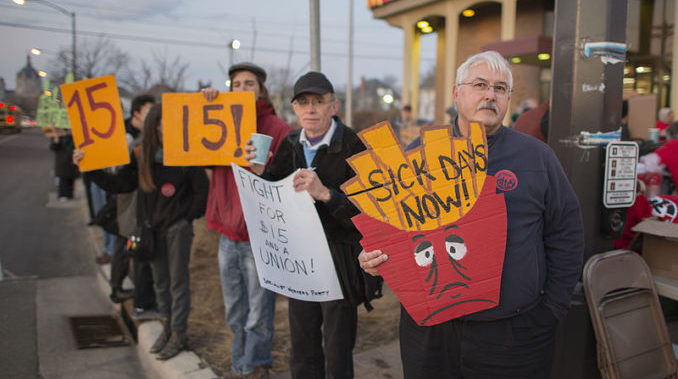
The purpose of this article isn’t to answer the question in the headline. That’s one of the ways in which readers stray: they look for an answer, when they should simply be looking for information.
Every year on May 1st unions organize strikes. It’s a tradition which dates back to 1886, when large protests were arranged to fight against working conditions which were resulting in thousands of yearly deaths and permanent injuries. The strikes temporarily crippled industry, and police were called to disperse the striking workers. In Chicago, in Haymarket Square, a bomb was thrown at the policemen and a riot ensued; in the end, seven policemen and eight civilians were killed. A trial was held for eight people who were accused of being behind the bombing, and despite a lack of solid evidence convictions (seven of which were death sentences) were delivered for all of them. Irregularities and apparent bias at the trial led to three of those convicted later being pardoned, while four were killed and the fifth committed suicide.
The apparent injustice of the trial and the terrible working conditions led to international solidarity movements and demands for worker safety.
Today, few have issues with those goals. Safety standards are vastly superior to those of the 1800s and workers have basic guarantees regarding the hours they can work. If anything, there are now complaints of the restrictions being too tight, as some workers find regulations choking down on how many hours they believe they can safely work or what tasks they can perform without getting special training; people are expected to get training on tasks as rudimentary as sitting in a chair.
The protests continue, though. Every year on the first of May union workers take to the streets and issue their demands. Throughout the course of my lifetime they have been for the same two items: more pay and more benefits.
I know enough about economics to recognize the inherent fallacy in the notion that raising non-salaried worker pay across the board will result in significantly more purchasing power for the average person. I also recognize the inherent inequity and loss of incentive which results from treating all workers as if they perform equally when they do not… something which is a core requirement for all unions. I have hardly been an advocate for unions throughout my life.
My contempt for them has grown when, in recent years, the great push on May Day has been for a “living wage”.
This year is different. This year, the strikes are mostly centered around safety again. Complaints have come from both union and non-union workers throughout the country that corporations providing essential goods are failing to provide basic protections against the spread of covid-19, while simultaneously seeing massive spikes in profits.
Amazon, particularly, has come under fire following an incident in New York where one worker was proven to have tested positive for covid-19, others at the facility claimed that at least ten other co-workers were showing obvious signs of the disease, and Amazon refused to shut the warehouse down for a deep cleaning. This, following many prior reports of dangerous working conditions at Amazon fulfillment centers.
Entwined with worker demands for safety come other demands. New workers should be eligible for sick time immediately after hiring, in case they come down with covid-19. People who exceed their normal sick days should receive full pay until such time as they are cleared by a doctor. Workers should receive paid time off if someone at their facility is diagnosed with covid-19.
And of course, with those remain the demands for higher wages and more benefits.
Some of the May Day demands, this time, seem completely reasonable. Others make sense, but hold the promise of abuse by more unscrupulous workers if granted in the broad fashion proposed. Yet others seem completely arbitrary and unwise.
All of this leads me to the belief that the strikers are right on some counts, wrong on others….
… but which counts? This is where thoughtful, informed people may disagree. More to the point, it’s where our individual life experiences encourage us to do so.
This is one of our great strengths as a nation. We were founded with the notion that no person is all-wise and all-knowing, and with the recognition that input from many sources is likely to produce the best possible result.
If we abandon individual thought in favor of simply following favorite pundits, journalists or politicians, we invite calamity.
